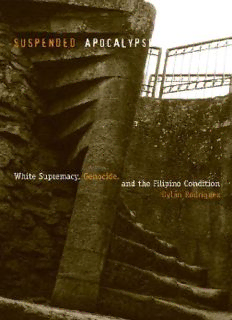
Suspended Apocalypse: White Supremacy, Genocide, and the Filipino Condition PDF
Preview Suspended Apocalypse: White Supremacy, Genocide, and the Filipino Condition
SUSPENDED APOCALYPSE Also by Dylan Rodríguez Forced Passages: Imprisoned Radical Intellectuals and the U.S. Prison Regime SUSPENDED APOCALYPSE White Supremacy, Genocide, and the Filipino Condition DYLAN RODRÍGUEZ University of Minnesota Press Minneapolis • London Anearlyversionofchapter3waspublishedas“‘AMillionDeaths?’:Genocideand theSubjectofFilipinoAmericanStudies,”inPositivelyNoFilipinosAllowed:Build- ingCommunitiesandDiscourse,ed.AntonioT.TiongsonJr.,EdgardoV.Gutierrez, andRicardoV.Gutierrez(Philadelphia:TempleUniversityPress,2006),145–61. Copyright2010bytheRegentsoftheUniversityofMinnesota All rights reserved. No part of this publication may be reproduced, stored in a retrievalsystem,ortransmitted,inanyformorbyanymeans,electronic,mechani- cal,photocopying,recording,orotherwise,withoutthepriorwrittenpermissionof thepublisher. PublishedbytheUniversityofMinnesotaPress 111ThirdAvenueSouth,Suite290 Minneapolis,MN55401-2520 http://www.upress.umn.edu LibraryofCongressCataloging-in-PublicationData Rodriguez,Dylan. Suspendedapocalypse:whitesupremacy,genocide,andtheFilipinocondition/ DylanRodriguez. p. cm. Includesbibliographicalreferencesandindex. ISBN978-0-8166-5349-2(hc:alk.paper)–ISBN978-0-8166-5350-8(pb:alk. paper) 1.UnitedStates–Relations–Philippines. 2.Philippines–Relations–United States. 3.Genocide–Philippines. 4.Racism–UnitedStates. 5.Filipinos–Social conditions. I.Title. E183.8.P5R642010 305.800973–dc22 2009033093 PrintedintheUnitedStatesofAmericaonacid-freepaper TheUniversityofMinnesotaisanequal-opportunityeducatorandemployer. 16 15 14 13 12 11 10 10 9 8 7 6 5 4 3 2 1 Contents Acknowledgments vii 1. Filipino American Communion Cultural Alienation and the Conditions of Community 1 2. Deformed Nationalism and Arrested Raciality The Grammar and Problematic of a “Filipino American” Common Sense 33 3. “Its Very Familiarity Disguises Its Horror” White Supremacy, Genocide, and the Statecraft of Pacifica Americana 98 4. Suspended Apocalypse Toward a Racial Analytic of the Filipino Condition 150 5. “Death Was Swiftly Running after Us” Disaster, Evil, and Radical Possibility 190 Notes 219 Index 247 This page intentionally left blank Acknowledgments This book has been shaped by multiple political influences and interventions,themostimportantofwhichhavebeenthepeople whohavechallenged,nourished,andproductivelydisruptedmy thinking on the historical present of white supremacist geno- cide and its layered production of the Filipino (and thus my own) condition. Of course, these influences and interventions areunquantifiableandareasoftenaccidentalandunexpectedas they are deliberate and intentional. I am humbled by the simple factthatanimmediateandextendedfamily,aswellasacherished political–intellectualcommunity,hasunconditionallybackedme inmyefforttoparticipateinaknowledgeproductionthatengages the historical state of emergency in which we are collectively located. The work of identifying and radically confronting the politicalstructuresthatcomposeusaspeoplesubjectedto—and who are thus also the troubled subjects of—the ongoing U.S. nation-buildingprojectisnotanindividuallabor,andsoIhope thatanythingdecentandusefulinthesepageswillbetakenasa reflection of everything beautiful and inspired about the people I list here. There are people whose impact on this book has been fun- damental. Rick Bonus, Oscar Campomanes, Jodi Kim, Martin Manalansan, Jared Sexton, Andy Smith, and Tony (Kuya Ton) Tiongson Jr. provided substantive critique, insight, and encour- agement of different aspects of the project; they have imprinted mythinkingincrucialways.IamespeciallyindebtedtoKuyaTon (andhiscoeditorsEdGutierrezandRickGutierrez)forsoliciting and publishing an early version of chapter 3 in the landmark vii viii / Acknowledgments anthology Positively No Filipinos Allowed: Building Commu- nities and Discourse, published by Temple University Press in 2006.VorrisNunley,MichelleRaheja,AmaliaCabezas,Tammy Ho, Keith Harris, Traise Yamamoto, Erica Edwards, Mariam Lam, Jonathan Walton, Alessandro Fornazzari, Freya Schiwy, andothers,friendswithwhomIshareadayjobattheUniversity ofCalifornia,Riverside,haveformedanintellectualandpolitical community that has kept me alive and, in important moments, thriving. My departmental colleagues Victoria Bomberry, Jayna Brown, Anthony Macias, Jennifer Najera, and Robert Perez, along with the aforementioned Jodi Kim, directly and indirectly facilitated my progress and are often the people on whom I rely for the most immediate and urgent institutional support. I am thankful for their presence in the Department of Ethnic Studies. Ioftenclaimcertainfriendsandscholarsasakindofextended political,intellectual,andaffectivefamily,andmycentralhopeis thatthe“familial”bondsweformareradical,liberationist,and creative rather than conventional or parochial. Keith Camacho, RuthieGilmore,JolieChea,JoãoCostaVargas,MarthaEscobar, RobertoLabrada,GabbyOcon,AdrienneHurley,DioMendoza (the brilliant artist), Viet Mike Ngo (who, after spending two decades in prison, must be released from his California cage), RamanPrasad,VianeyRamirez,SormehAyari,RandallWilliams, CraigGilmore,andothershavesharedmanyameal,laughedat toomanyjokes,andprovidedmethebackbonetomovearound intheworldasIdo.DavidMartinez,AmarRaheja,andAlfredo Cruzhavebeengreatinterlocutorsandfishingpartners,andthe mental clarity I attain in my time with them has been essential to the completion of this book. I am grateful to Richard Morrison and Adam Brunner at the University of Minnesota Press for their patience, attention, and obvious commitment to this book. I cannot imagine a better publishingandeditorialexperiencethantheoneIhavehadwith them, and it is no accident that my first two books have been published through the University of Minnesota Press. Acknowledgments / ix I would not have had either the courage or the capacity to complete this book without the guidance, unflinching support, andmentorshipofAngelaDavis,ArifDirlik,AveryGordon,Joy James, Lisa Lowe, Gary Okihiro, David Pellow, Laura Pulido, Beth Richie, David Roediger, Phil Scraton, Neferti Tadiar, and RuthieGilmore.JamesTurner’sinfluenceonmythinkingisper- manent, as is the model of intellectual seriousness embodied by ShelleyWong.SteveCullenberg,thelateEmoryElliott,Katherine Kinney,andTobyMillerhaveliterallykeptmeatU.C.Riverside. Lucy Burns, Jody Blanco, Lisa Yoneyama, Tak Fujitani, Denise Ferreira da Silva, Lisa Park, David Leonard, and Jim Lee gener- ouslylistenedtomyideas,andeachconvincedmethatmylabor is part of something larger, collective, and historical. Imustgivespecialthankstotheorganizersofandparticipants intwounmatchedpolitical–intellectualandscholaractivistevents duringthespringof2008:“PhilippinePalimpsests:FilipinoStud- ies in the Twenty-first Century” at the University of Illinois and “From the Plantation to the Prison: Imprisonment and U.S. Culture” at Yale University. Augusto Espiritu, Lisa Cacho, and Martin Manalansan organized “Philippine Palimpsests,” which was a historically unprecedented gathering of U.S.-based Fili- pino scholars. Reynaldo Ileto, Kimberly Alidio, Richard Chu, Julian Go, Linda Maram, Nerissa Balce, Victor Bascara, Fran- cisco(Kiko)Benitez,JodyBlanco,LucyBurns,DeniseCruz,Kale Fajardo,TheoGonzalves,VictorMendoza,MartinJosephPonce, JeffreySantaAna,SaritaSee,AlanIsaac,RickBaldoz,AnnaGue- varra,EmilyIgnacio,DinaMaramba,RobynRodriguez,Neferti Tadiar,Benito(Sunny)Vergara,RickBonus,GenevieveClutario, and Constancio Arnaldo produced a rich, dense, and catalyz- ing body of dialogue. The work of David Stein, Sarah Haley, Naomi Paik, and others involved with Yale’s Marxist and Cul- turalTheoryWorkingGroupresultedinmyinvitationto“From the Plantation to the Prison,” and their thoughtful responses to chapter 5 of this book were both affirming and enlighten- ing. Fellow panelists Ruthie Gilmore and Colin Dayan, along
Description: